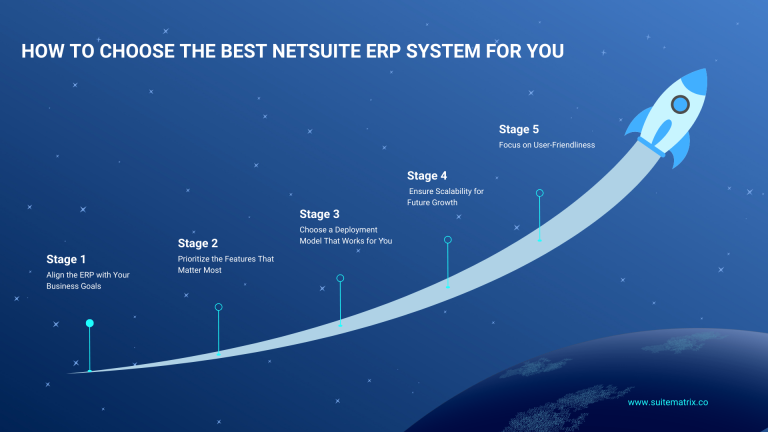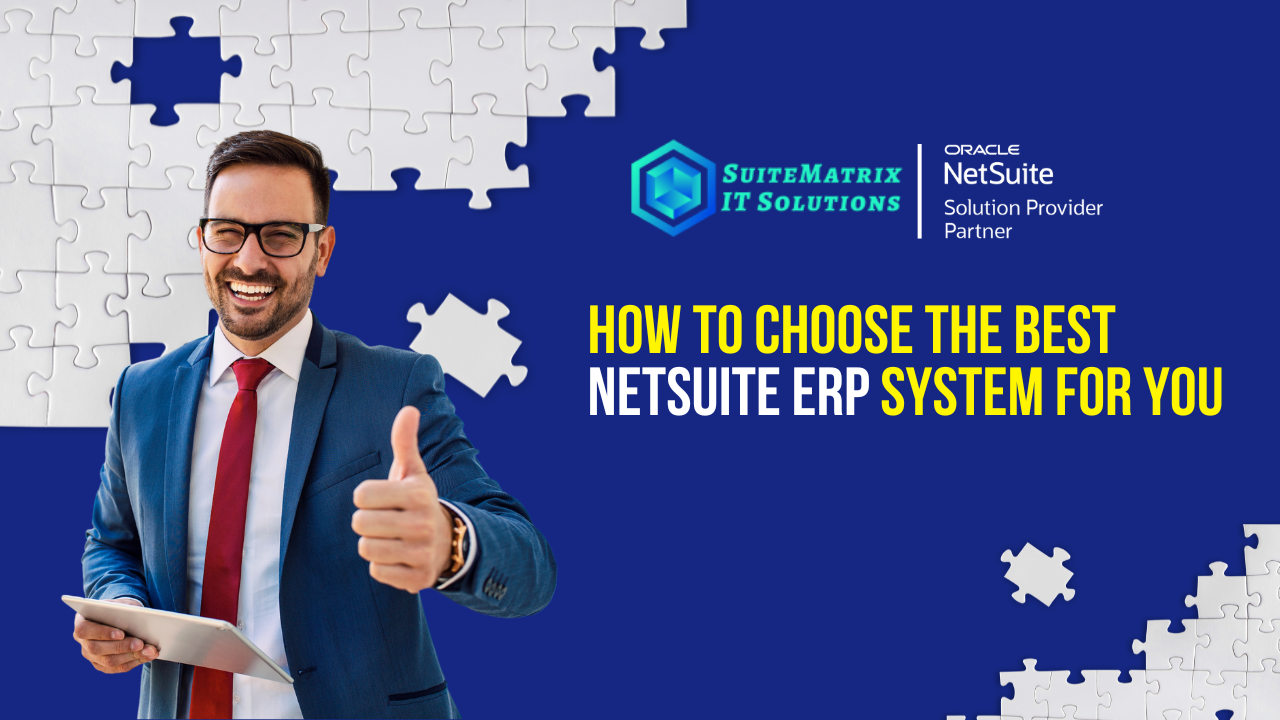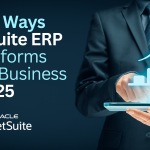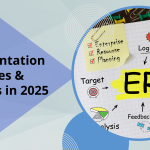Table of Contents
- Introduction: Why Choosing the Right ERP Matters
- Align the ERP with Your Business Goals
- Prioritize the Features That Matter Most
- Choose a Deployment Model That Works for You
- Ensure Scalability for Future Growth
- Focus on User-Friendliness
- Look for Integration Capabilities
- Evaluate Customization Options
- Understand the Total Cost of Ownership
- Check Vendor Reputation and Support
- Prioritize Security and Compliance
- Final Thoughts: Why NetSuite Deserves a Spot at the Top of Your List
- FAQs
Choosing an ERP system isn’t just an IT decision—it’s a business strategy move that can shape your company’s growth, efficiency, and profitability for years to come.
With so many ERP solutions on the market, how do you choose the one that truly fits your needs? In this guide, we’ll walk you through key factors to consider, while showing why NetSuite ERP consistently stands out as a top choice for growing businesses.

- Align the ERP with Your Business Goals
Before you compare products or pricing, take a step back and think about what you want to achieve.
Are you looking to:
- Streamline operations
- Improve reporting
- Gain real-time insights across departments
- Support multi-location or global growth
The right ERP should help you reach your goals—not just automate what you’re already doing.
Why NetSuite wins here:
NetSuite is designed to be scalable and flexible, adapting to businesses as they grow or evolve. Whether you’re a startup planning for expansion or an established company opening new locations, NetSuite grows with you, eliminating the need for costly future migrations.
- Prioritize the Features That Matter Most
Every ERP system has a long list of features. But which ones will actually impact your business?
Identify your “must-haves” versus “nice-to-haves.” Depending on your industry, this might include:
- CRM integration
- Project management
- Multi-currency and multi-tax support
Why NetSuite stands out:
NetSuite offers a complete suite of built-in modules covering financials, CRM, inventory, eCommerce, project management, and more—all in one platform. Unlike many ERPs that require third-party add-ons, NetSuite’s unified system ensures data consistency and fewer integration challenges.
- Choose a Deployment Model That Works for You
Should you go with on-premises or cloud-based ERP?
Cloud ERP offers:
- Anywhere, anytime access
- Automatic updates
- Lower upfront costs
- Reduced IT maintenance
Why NetSuite is ideal:
NetSuite was built in the cloud from day one, not retrofitted like many competitors. This means it’s optimized for cloud performance, security, and scalability. Plus, you won’t have to worry about software upgrades—they happen automatically without disrupting your business.
- Ensure Scalability for Future Growth
Your ERP system should work today—and tomorrow. Ask:
- Can it handle more users as we grow?
- Will it support expansion into new markets?
- Can we add new modules later?
Why NetSuite is future proof:
NetSuite is designed for businesses of all sizes, with scalability built in. You can start small with core modules and expand functionality as your needs change—without needing to switch platforms.
- Focus on User-Friendliness
No matter how powerful an ERP is, it won’t help if your team struggles to use it.
When evaluating systems, check:
- Is the interface intuitive?
- How much training is required?
- How easy is it to customize dashboards or reports?
Why users love NetSuite:
NetSuite’s interface is clean, modern, and customizable. Employees can easily tailor dashboards to their roles, while managers can set permissions and workflows without complex coding. This ease of use leads to faster adoption and fewer errors.
- Look for Integration Capabilities
ERP shouldn’t be an island. It needs to integrate with your other systems like CRM, eCommerce, payroll, or custom apps.
Questions to ask:
- Does it offer built-in integration?
- Can it connect via APIs?
- Will integration require costly custom development?
Why NetSuite is integration-friendly:
NetSuite includes SuiteTalk (a robust API), pre-built connectors, and integration tools to easily link with Salesforce, Shopify, PayPal, and many other platforms. This makes it simpler and more affordable to keep all your business systems connected.
- Evaluate Customization Options
Every business has unique processes. The ideal ERP lets you customize without heavy coding or breaking upgrades.
Key things to check:
- Can workflows be adjusted easily?
- Can reports be modified or created?
- Will customizations carry forward during upgrades?
Why NetSuite excels here:
NetSuite offers SuiteBuilder (for point-and-click customization), SuiteScript (for deeper development), and SuiteFlow (for workflow automation)—all designed to allow flexibility without jeopardizing future updates.
- Understand the Total Cost of Ownership
ERP costs aren’t just about licensing. You’ll need to consider:
- Implementation fees
- Training costs
- Maintenance and support
- Potential integration or customization expenses
Why NetSuite provides long-term value:
While NetSuite may have higher initial subscription costs than some entry-level solutions, its built-in modules, automatic updates, lower IT overhead, and scalability often result in a lower total cost of ownership over time. Avoiding costly re-implementations down the road can save significant money.
- Check Vendor Reputation and Support
An ERP vendor should be a long-term partner, not just a software provider.
Research:
- Customer reviews and satisfaction ratings
- Industry awards or recognitions
- Support responsiveness and expertise
Why NetSuite is trusted globally:
With over 45,000 customers in more than 200 countries, NetSuite is a proven leader in cloud ERP. Its global partner ecosystem, dedicated account managers, and 24/7 support mean you’re never alone in your ERP journey.
- Prioritize Security and Compliance
ERP systems hold sensitive data. Security and compliance should never be an afterthought.
Key requirements:
- Data encryption
- Role-based access controls
- Regulatory compliance (GDPR, HIPAA, SOX)
Why NetSuite gives peace of mind:
NetSuite provides enterprise-grade security, full audit trails, role-based permissions, and compliance with key standards. Its cloud infrastructure is continuously monitored and updated to protect your data.
Final Thoughts: Why NetSuite Deserves a Spot at the Top of Your List
Choosing an ERP system is one of the most important investments you’ll make in your business. If you’re looking for a solution that’s scalable, cloud-native, user-friendly, flexible, and secure, it’s hard to beat NetSuite ERP.
By aligning your business goals with a solution like NetSuite, you’ll not only solve today’s problems—you’ll build a platform for growth that adapts with you over time.
At SuiteMatrix, we’ve helped dozens of businesses successfully implement NetSuite ERP to streamline operations, improve visibility, and drive smarter decisions.
Need expert advice on selecting or implementing NetSuite? Contact us today for a free consultation.
FAQs
- Is NetSuite ERP only for large businesses?
No—NetSuite is scalable for small, midsize, and enterprise businesses. You can start small and add features as you grow. - How long does NetSuite implementation take?
Typical implementations take three to six months depending on complexity. - Can NetSuite integrate with my existing CRM or eCommerce platform?
Yes. NetSuite offers built-in integrations and APIs for many popular platforms. - Is NetSuite customizable?
Absolutely. NetSuite allows both low-code and developer-level customization. - How secure is NetSuite ERP?
Very secure. NetSuite uses enterprise-grade encryption, role-based controls, and meets key compliance standards.



